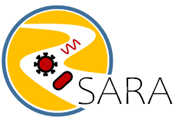Surveillance of Emerging Pathogens and Antibiotic Resistances in Aquatic Ecosystems
Appropriate methods for wastewater-based epidemiology (WBE) and a better understanding of the fate of pathogenic viruses and antibiotic-resistant bacteria from the sources to river basins and estuaries are urgently required. Our project will determine the prevalence of pathogenic viruses (including SARS-CoV-2), microbial indicators, antibiotic resistance, and microbial source tracking (MST) markers in wastewater, surface water, coastal sea waters, sediment and bivalve molluscan shellfish (BMS) in catchments located in different climate areas (Sweden, Germany, France, Spain, Portugal, Israel, Mozambique, and Uganda). The project aims are: (i) method harmonization and training of European and African partners, (ii) SARS-CoV-2 detection in raw wastewater as a biomarker of COVID-19 cases, (iii) enteric viruses, antibiotic resistances and MST markers monitoring in aquatic environments, (iv) evaluation of sediments and BMS as integral reservoirs, (v) determination of the impact of climate and extreme weather events, and (vi) microbial risk assessment for water resources. Results and recommendations will be transferred to the scientific community by peer-reviewed papers and conference presentations. International health and environment organisations as well as authorities and waterworks that represent end-users on a global, European and African level will participate in the Stakeholder Forum.
Keywords
SARS-CoV-2, viruses, antibiotic resistance, microbial source tracking, integrated monitoring
Project Website
Achievements so far
Key achievements of the SARA project include the introduction of culture and molecular methods for aquatic environmental monitoring, with a focus on harmonisation and capacity building in African partner laboratories. Initial screening for antibiotic resistance genes (ARGs) has identified key ARGs for routine monitoring, facilitating sampling campaigns at different model sites. The project emphasises dissemination of results through a stakeholder forum involving international health and environmental organisations, European water associations, local water utilities and authorities. These results will improve the understanding of pathogenic viruses, antibiotic resistance and microbial source tracking markers in wastewater, surface water and coastal seawater environments.
If you're interested in scientific publications associated with SARA, click here.
